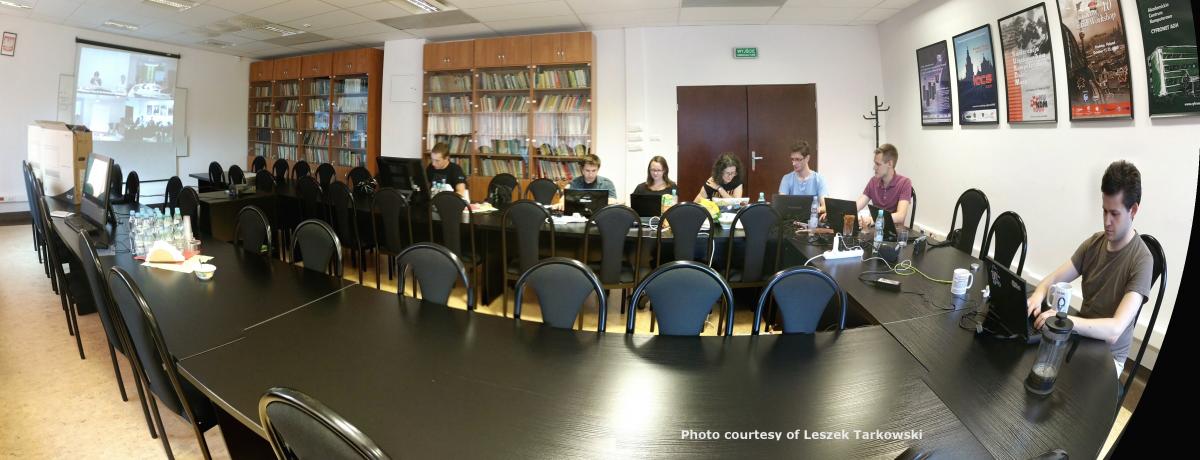A sprint to new materials for Software Carpentry
Posted on 1 August 2014
A sprint to new materials for Software Carpentry
By Aleksandra Pawlik, Training Lead.
Nine people, two days, two venues, two proper Polish lunches, many pull requests and one tour in the super computer centre. This summarises the Software and Data Carpentry sprint in Krakow during which we created new materials for Software Carpentry and updated existing materials. The team in Poland was one of nineteen teams taking part in the Mozilla Science Lab global sprint on 22-23 July 2014.

The idea of the sprint was based on the Random Hack of Kindness approach in which the teams all around the world work on hacks 24/7 (due to the different time zones in which the work is completed). The teams in the Software Carpentry sprint were located in Australia, New Zealand, Europe, US and Canada. When the teams in Australia and New Zealand were finishing their day, they handed over to the European groups. Around lunchtime in Europe, the (early birds!) teams in the North America were starting to join in. All sites had webcams streaming live picture. We could see and talk to each other, and it was really motivating to see people around the world hacking away or writing new materials for lesson.
These were the two main goals of the sprint. During the weeks before the event, everyone could propose their project (more details are on this Etherpad - beginning from line 62). In Krakow, we focused mainly on the development of training materials for Data Carpenty which teaches researchers basic concepts, skills, and tools for working with their datasets. One of the member of Krakow's group, Piotr Banaszkiewicz worked on his own project: A Web-Based Tool for Peer Instruction.
The Krakow's team was lead by Klemens Noga (Cyfronet AGH) and Leszek Tarkowski (czterybity.pl). The other seven participants were (in alphabetical order): Piotr Banaszkiewicz (AGH University of Science and Technology), Maciek Czuchry (Cyfronet AGH), Iwona Grelowska (AGH University of Science and Technology), Tomasz Jonak (AGH University of Science and Technology) Sebastian Kupny (Jagiellonian University), Aleksandra Pawlik (Software Sustainability Institute) and Łukasz Zosiak (whose employer, ABB Stotz-Kontakt GmbH, kindly agreed to spare some of the time off work for the sprint). On the first day, the sprint was hosted by Academic Computing Centre Cyfronet, where we also worked in the morning on the second day. For the last four hours of the sprint we moved to Ambasada Krakowian, the headquarters of four NGOs, located in the heart of Krakow's Old Town.
Over the course of two days we worked on new material for using the Python and pandas library for data manipulation. We also contributed to expanding lessons for working with data in spreadsheets. Two of us reviewed the lessons on shell. And we also added to the material on using matplotlib.
On the first day of the sprint Klemens Noga arranged a tour round for all participants to see Cyfronet's supercomputer Zeus. Zeus is noted in the famous Top 500 ranking and allows hundreds of researchers to run the code which advances their research.
The sprint in Krakow would be extremely difficult to organise without the help from two hosting institutions: Cyfronet and Ambasada Krakowian; as well as the generous support from ELIXIR-UK, which collaborates closely with Data Carpentry.
The Mozilla Science Lab sprint is over but the work carries on. The event was a real boost and we got a lot of stuff done. But, as Greg Wilson said, "the real purpose of sprints isn't the code, it's getting to know people".

